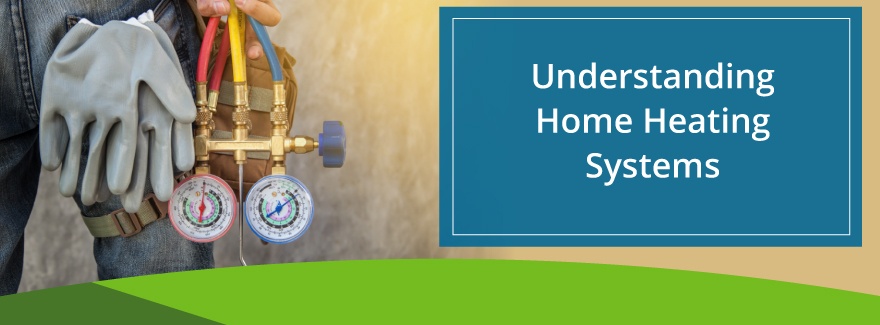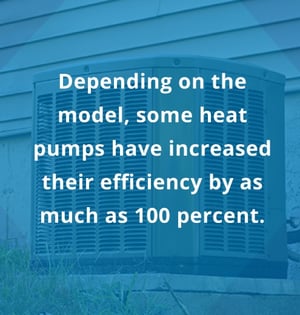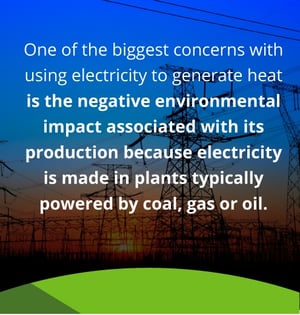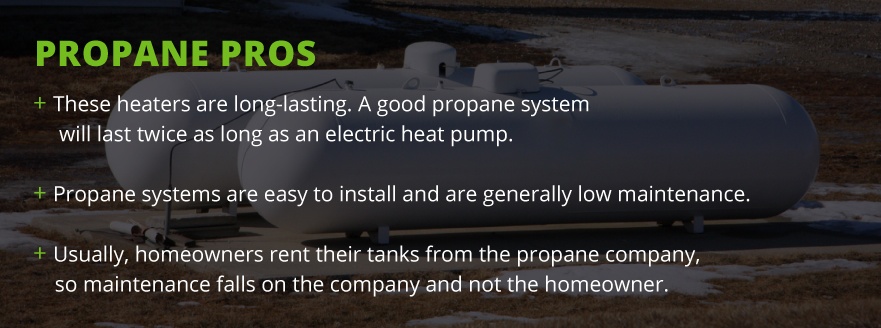
If you're like most homeowners, you don't really think much about how your house is heated — until the heat stops working. And then you panic. Not only can replacing your heating system be a big expense, but these days there are so many options available to you. It's downright overwhelming.
It doesn't have to be that way.
Whether you're a brand-new homeowner or you've been in the same house for decades, at some point you will have to confront the truth about your heating system. After all, your home heating system is responsible for 42 percent of your energy bill. In fact, heating generally costs more than any other system in your home, which means it's also one of the biggest investments you can make.
When you're shopping for a heating system, the options out there can be overwhelming — but we think the variety is actually a good thing. Different homes and budgets need different kinds of heat. And part of purchasing a new unit is determining what will be best for your home and your wallet. To make the best use of your money, you need to understand what you're putting money into and what you're getting out of it as a result.
You could spend days researching all the options available to you. And you'll probably end up more confused than you were before you started. So, before you hit the panic button over this big decision, let's start by understanding the different types of home heating systems and how each one can work for you.
Types of Heating Systems
Most people rely on a central heat source as their primary home heating method. A central heat source is defined as a primary source that evenly distributes heat into each room of the house. It's an umbrella term used to refer to any system that performs that function, regardless of how the heat is generated and how it is delivered to each room. These days, there are three primary central heating systems available to choose from.
Boilers
Fuel options: natural gas, heating oil, propane, electricity

Boilers are basically water heaters that specifically provide heat to your home through hot water. Whichever fuel option you have in your home powers the boiler to heat up water. Once the water is at the correct temperature, it then travels through a system of pipes into radiators or other devices in your home. Once the heat comes out of the water, the cooler water returns to the boiler and the cycle starts again.
While there may be some alternative options depending on where you live, residential hot water systems like this — known as hydronic systems — are typically fueled by natural gas or oil. While most people are familiar with radiators or baseboard units that distribute boiler heat, a newer and more efficient option — radiant floor heat — is also generated by this method. With heated water circulating through pipes installed under the floor, it provides a constant, super-efficient method of home heat. While you'll save in energy costs down the road, however, radiant floor heat is typically a big initial investment that will put a lot of pressure on your wallet, so most people prefer the more traditional delivery methods.
Note: Although not as common today, steam boilers employ the same concept, but instead of sending heated water through pipes throughout the house, they send steam through the pipes and it condenses to water as it cools.
Boiler pros:
- Boilers use a pump to send the hot water throughout the house, rather than a fan and duct system. When used correctly, this method of heat distribution tends to be more energy efficient and distribute heat more evenly throughout your entire house.
- Boiler heat lends itself nicely to using zoned thermostat controls to separately heat different areas of your home.
- Because this system "radiates" heat into each room, it eliminates the noise that comes from other units that use a fan to blow the warm air into each room.
Boiler cons:
- Location can limit your options. Because natural gas and oil are the two most commonly used fuels with boiler heat, you'll have to make sure you live in an area where these are available. Natural gas is the most efficient option for this type of heat, but if it's not available, you'll have to decide if you're willing to pay the higher costs associated with oil.
- Saving money on your energy bills may cost you more up front. Because they are more energy-efficient, boilers can be expensive to install. On average, homeowners are paying $5,311 for a new boiler and installation, with others paying slightly more or less depending on the model they select.
Furnaces
Fuel options: natural gas, propane, heating oil, electricity
The most common type of central heating system in North America is a furnace. A furnace generates warm air when fuel is mixed with air and then burned. Once it has created the warm air, it blows warm air through ducts and distributes it into each room by a fan blowing it through an air register. There are a variety of fuel options with furnaces, depending on your preference and what's available in your region.

Furnace Pros:
- They are the most common and relatively inexpensive type of heating system.
- Furnaces are easy to maintain and easy to find someone to repair.
- They can be powered by a variety of options, depending on your system and what's available in your area.
- Modern furnaces are designed to increase energy efficiency and decrease any negative environmental footprint.
Furnace Cons:
- They are typically only controlled by one central thermostat in the house, and therefore cannot be used for zone heating.
- The fan that forces the warm air through the air returns may be noisy, causing interruptions throughout the day and nighttime.
 Heat Pumps
Heat Pumps
Fuel options: electricity, geothermal energy
Heat pumps once had a reputation for being incredibly inefficient. But, with many advances in their makeup, they have once again become a good option for heating your home, especially if you live in a moderate climate where bitterly cold winters are uncommon. In fact, depending on the model, some have increased their efficiency by as much as 100 percent. Known as "two-way air conditioners," heat pumps operate by pulling heat out of the house in the summer and pumping heat into the house in the winter. Heat pumps use a forced air delivery method to deliver the heat to each room of the house.
Heat pumps can be divided into two categories — air source and ground source. Air source heat pumps use outside air as their source of heat in the winter and as their heat sink in the summer. Ground source heat pumps pull heat from the ground in winter. Air source heat pumps are cheaper and easier to install and maintain. And, if you have the money to put into it up front, ground source heat pumps are more energy-efficient and save money over time. Many people who purchase ground source pumps do so when they want to live more sustainably and they know they will be living in their house for a long time.
Note: Ground source heat pumps are also called geothermal, GeoExchange or GX.
Heat Pump Pros:
- Depending on your location, a heat pump can provide your heat and air conditioning from the same unit.
- It's a more cost-efficient option for people living in moderate climates that don't experience extreme cold.
- A heat pump turns on and off less often than a gas furnace.
- Similar to a boiler, heat pumps have a reputation for distributing heat more evenly than a furnace.
Heat Pump Cons:
- Depending on which type you choose, it may be expensive to install.
- Heat pumps as a primary heat source are generally ineffective in colder climates.
- It produces a more "mild" heat that might not feel warm enough to people used to other types of furnaces.
- Some systems may require a supplemental or backup heat source to properly heat a home.
Common Types of Fuel for Heating
When selecting which central heating system you want for your home, another big consideration must be the kind of fuel you are going to use. As we mentioned, certain systems typically function with certain types of fuel. There are four big questions you'll want to answer before deciding which fuel option is the right one for you.
- Which fuel options work with the system I'd like to purchase?
- Are the fuel options that work with my system available in my area? For example, if you want to purchase a boiler powered by natural gas, do you have a local provider, and do you have access to their lines?
- How much will this type of fuel cost every month, and how does that compare to my other options?
- What environmental impact does this type of fuel have?
To answer these questions, you'll want to understand more about the different types of fuel options available. While there are many, many options available to consumers today, the most common are oil, electricity, natural gas, propane and geothermal energy.
Oil
Heating with oil is still relatively common, especially in the Northeast, which accounts for 87 percent of heating oil consumption in the United States. In recent years, rising costs of oil, as well as extremely cold temperatures, have resulted in rising energy costs for oil users which have left this traditional heating method with some negative vibes. However, it continues to be a tried-and-true source of home heat because the cost is worth the benefits.
Heating systems that employ oil draw the oil from a tank using a pump. The tanks are generally above-ground and are filled by a tanker truck as needed. Consumers can schedule regular fill-ups or order on demand as needed. While this heating method is older, it's definitely not outdated. In fact, today's systems work at more than 90 percent efficiency and are proven to provide more energy per gallon than propane or butane.

Oil Heat Pros:
- It powers extremely efficient heat sources.
- An oil-powered heating system is cheaper to purchase than a gas one.
- Oil heat works well with boiler systems, which are quieter, and generate a lot of warmth — increasing your comfort levels during those cold winter months.
Oil Heat Cons:
- Extreme cold results in more oil used, which can be more expensive.
- Pricing and availability can vary with the oil market, making it difficult to budget your energy costs.
 Electricity
Electricity
One of the biggest concerns with using electricity to generate heat is the negative environmental impact associated with its production because electricity is made in plants typically powered by coal, gas or oil. However, it is one of the more common heating options and generally more cost-effective.
Electricity Pros:
- Electricity is inexpensive. Between 2014 and 2015, electric heat users paid $960 in energy costs. In comparison, heating oil users paid $1,851.
- Electricity is a safer energy source because electricity-powered furnaces don't generate gases as byproducts. Because these furnaces don't generate heat through combustion, the chance of them starting a home fire is low.
Electricity Cons:
- Electric-powered heat systems are typically less efficient than an oil or natural gas-heated option.
- The heat produced by electricity isn't as warm as with some other options.
Natural Gas
Used in 57 percent of all U.S. homes, natural gas continues to be the current most popular choice for home heating. Natural gas is a popular choice because it is energy-efficient, meaning your energy bills will be smaller. It is the cleanest fossil fuel you can use. And, as you use hot water for showers and household chores, it can work faster to replace what you used. That means it can handle those long, hot showers your spouse likes to take before bed.

Natural Gas Pros:
- Cost-effective
- Efficient
- The cleanest fossil fuel available
Natural Gas Cons:
- Limited availability in the southern and western parts of the United States
- Because of the use of gas, safety is always a concern, and proper maintenance of a natural gas-powered system is crucial. Carbon monoxide poisoning is particularly a factor, and carbon monoxide detectors are essential in any building that uses a natural gas system.
Propane
Although not as common as electricity and natural gas, propane heat can be a smart option. It's typically stored in above-ground tanks of various sizes outside the residence and filled as needed.

Propane Pros:
- These heaters are long-lasting. A good propane system will last twice as long as an electric heat pump.
- Propane systems are easy to install and are generally low maintenance.
- Usually, homeowners rent their tanks from the propane company, so maintenance falls on the company and not the homeowner.
Propane Cons:
- Above-ground tanks risk damage from storms and debris.
- Costs for propane vary by region, so costs in one area don't always reflect costs in another area.
Geothermal Energy
Geothermal energy is exactly what it sounds like: energy from the earth. Typically used with a heat pump system, it relies on a heat exchanger buried underground to pull heat from the surrounding earth for warming your home. The heat pump pulls the warm air through the exchanger and delivers it into the home.

Geothermal Energy Pros:
- The system is hidden underground, so there's no unsightly HVAC system to mar your beautiful landscape.
- Since ground temperatures don't change as much or as quickly as air temperatures, they're more efficient at heating and cooling.
- Because they emit no greenhouse gases, they are quiet and highly efficient.
- In some cases, they can actually be easier to maintain, even with being underground.
Geothermal Energy Cons:
- They cost more up front. If you're worried about the cost, you can investigate certain government subsidies earmarked to help with installation, but you'll need to do your homework to understand how this works and if you qualify.
- Eliminates certain risks of more traditional options, such as the risk of carbon monoxide poisoning.
Before You Buy
Did you know the first thing you should do in preparation for buying a new heater has nothing to do with your heating unit? That's right. Before you start getting estimates or comparing options, there's something else you should do: Improve the efficiency of your home.
Are the windows drafty? Do you have ceiling fans? Are your rooms properly insulated? The more you can do to improve your home's efficiency, the smaller heating unit you will need to purchase. And that means more money left in your wallet.
We realize in some cases you don't have the luxury of taking the time to make improvements before purchasing a new heating unit. So, if efficiency improvements aren't an option for you right now, you need to jump right to purchasing.
Once you've determined the type of heating system you want, it's time to purchase a unit. Your heating professional will be able to make recommendations for you, but ultimately it's up to you to decide what you need. Before you make a final decision, make sure you talk to them and ask:
- What size unit is best for my home? This depends on the size and efficiency of your home. You don't want to get caught paying for a bigger unit than your home needs.
- What kind of ENERGY STAR® rating does this unit have? The colder your climate, the higher you want the unit's ENERGY STAR® rating to be. On the flip side, if you live in a more moderate climate where your use of the heater will be limited, the extra investment of going from an 80 percent rating to a 90 percent rating might not be worth the extra cost.
- What kind of maintenance will a unit like this need? As we mentioned, some types of heat and the equipment associated with their system can require different levels of maintenance. And maintenance means money. Make sure you have an idea of what you're looking at down the road.
- What are the risks associated with this kind of unit and/or fuel? While heating systems today are better than ever before, they do come with their fair share of risks, particularly if you don't understand the maintenance issues we mentioned above. Not only that, in the case of natural gas, you'll want to make sure you purchase the necessary carbon monoxide detectors to place around your house to prevent accidental exposure in case of a leak.
It all comes down to determining the best type of system for your house and the best type of fuel for your budget. We realize it can be overwhelming to sort through all the options, but with the right tools, you can make an informed decision and enjoy a warm, comfortable home for years to come.
At Smart Touch Energy, we work tirelessly to help our customers purchase energy products in a simple, cost-effective manner. In fact, we've designed our services around the idea that buying fuel oil online should be easy and save you money. Whether you want to set up an automatic delivery schedule, purchase oil on demand or schedule maintenance for your burner or AC unit, we're here to help.

Serving customers in New Jersey, New York, Massachusetts, Connecticut, Pennsylvania, Maryland, Rhode Island, New Hampshire, Maine and Delaware, we work with local dealers to provide prompt delivery at low prices. Since 2015, we have saved our customers more than $850,344 on their heating oil orders.
If you're looking to save on heating oil costs, we'd love to help you do that. Visit us online and let us help you start saving money today.



